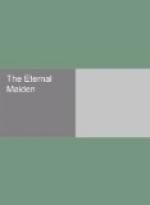“Annadoah! Annadoah!” he sobbed the name again and again, and in his voice throbbed all the piteousness, all the bitterness of his utter heartbreak. There was no reproach in his shuddering sobs; only sorrow, only the desolation and eternal heart-ache of that which loves mightily, unrequitedly, and realizes that all it desires can never, never be.
Ootah asked himself all the questions men ask in such a crisis; why, when he loved so indomitably, the heart of Annadoah should stir only with the thought of another; why the spirits that weave the fabric of men’s fate had designed it thus. Why the ultimate desire of the heart is forever ungranted and an intrinsically unselfish love too often finds itself defeated—these questions, in his way, he asked of his soul, and he demanded, with wild weeping, their answer from the dead rejoicing in the paling Valhalla. But there was no answer—as perhaps there may be no answer; or, if there is, that God, fearing lest in attaining the Great Desire men should cease to endeavor, to serve and to labor, has kept it locked where He and the dead live beyond the skies.
Ootah fell prostrate to the ground and his body throbbed on the ice in uncontrollable throes of grief. The aurora faded above him. Darkness closed upon the earth. Sitting in her igloo, startled, vaguely perplexed and half-afraid, Annadoah heard him sobbing throughout the night.
VIII
“For a long black hour of horror they were driven over the thundering seas and through a frigid whirlwind of snow sharp as flakes of steel . . .
“Seeing Ootah turn slightly toward Annadoah, Maisanguaq sprang at his throat. Their arms closed about one another . . . The floe rocked beneath them—they slipped to and fro on the ice . . . About them the frightful darkness roared; they felt the heaving sea under them. And while they struggled in their brief death-to-death fight, the floe was tossed steadily onward._”
The long night began to lift its sable pall, and at midday, for a brief period, a pale glow appeared above the eastern horizon. In this brief spell of daily increasing twilight the desolate region took on a grey-blue hue; the natives, as they appeared outside their shelters, looked like greyish spectres. Ootah felt the grim grey desolation color his soul.
He had regained his strength, and his wounds had healed with the remarkable rapidity that nature effects in people who lead a primitive life; only the hurt in his heart remained. Annadoah had often visited him, and while he lay on his bed of furs she had boiled ahmingmah meat and made hot water over the lamp very solicitously. Once, half-hesitating, she looked into his eyes, and as though she had a confession to make, said quietly:
“Thou art very brave, Ootah.”
This pleased him—once she had said he had the heart of a woman.




